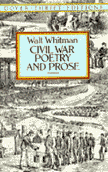
by Walt Whitman
 |
Oh Captain! My Captain!
by Walt Whitman |
| Poem
O Captain! My Captain! O Captain! My Captain! our fearful trip is done;
|
| Historical Significance
This poem though militaristic, actually refers
to Whitman’s own dismay at the death of Abraham Lincoln on April 15, 1865.
The poem, by referring to Lincoln as “My Captain” or “My Father” shows
just how supportive the people were of Lincoln and his policies and what
faith they had in their president. It also glorifies the Civil War through
its ardent patriotism, through his use of a militaristic setting, and by
doing that, glorifies everything that Lincoln did for the Union. The poem
also infers that Lincoln died for a cause, despite the fact that in reality,
he was assassinated. His cause was to restore the union, and truthfully
he did die nobly for his cause by being assassinated by John Wilkes Booth,
a southerner who like many, did not like Lincoln’s new policies for the
south. However, by assassinating Lincoln, the southerners actually
|
| Customer Review
Every time, I read this poem, I think of the movie Dead Poet’s Society when the boys stand on their desks and recite the poem as an act of retaliation against their schoolmaster for firing the only good teacher they ever really had. In a way, I think that Whitman’s original intention was very similar, only directed at Abraham Lincoln instead. I love this poem because it really represents the romanticism of Whitman’s time and I can just imagine myself getting all emotional if I heard this poem during his time. It is patriotic, eloquent, and yet short. Not only, does it represent the sadness of his untimely death, but it also demonstrates how his death was the ending of an era, and a very important one at that. |